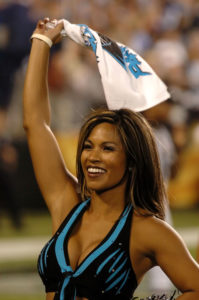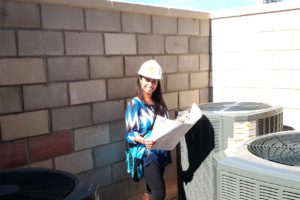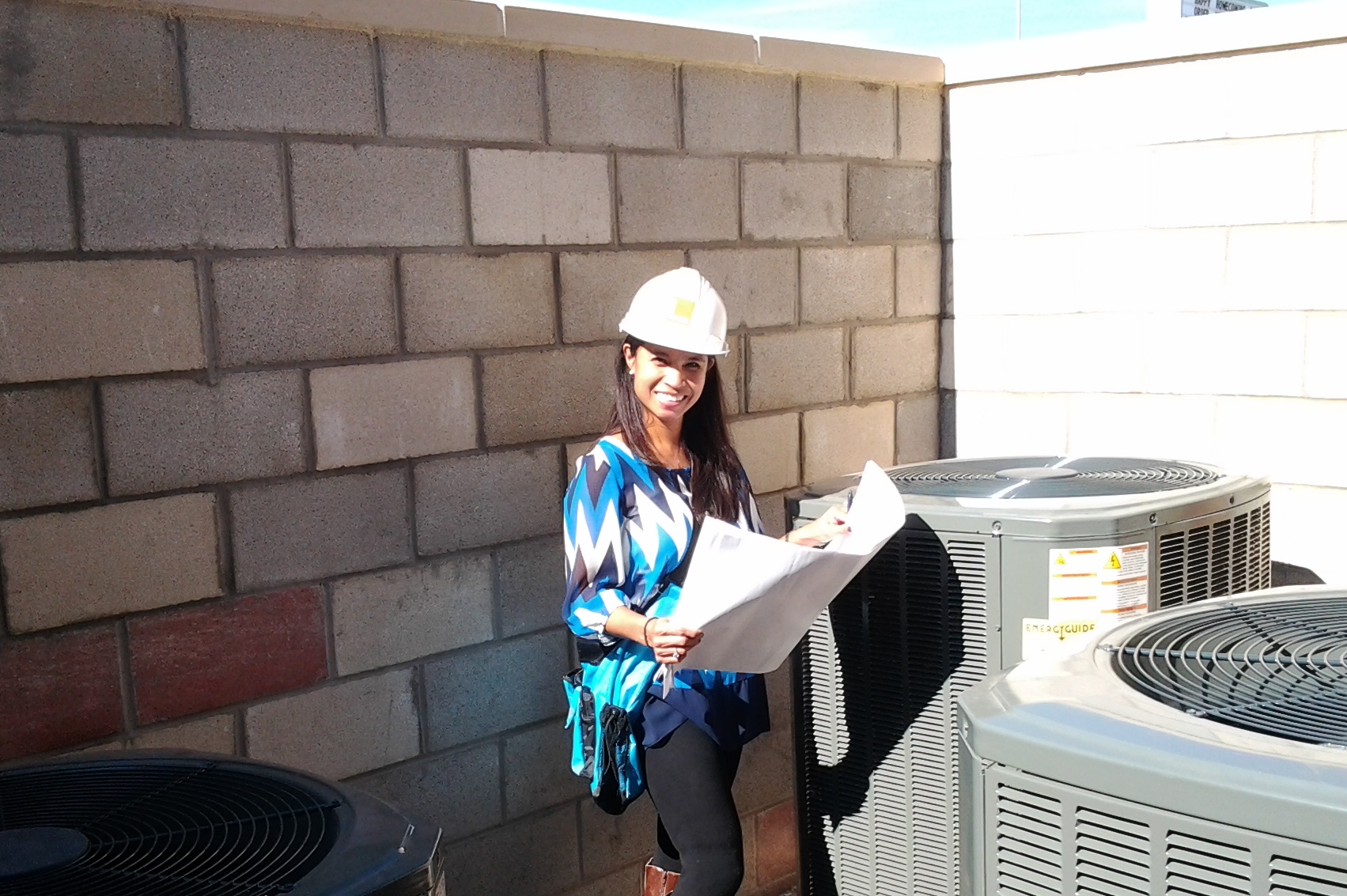
Greetings, Science Cheerleader fans! Jennifer, a multi-year cheerleader with the Carolina Panthers, has been enjoying her career in HVAC engineering and being a mom. How does all that fit together? Read on and find out!
What turned you on to engineering and when?
As I child, I was always intrigued with putting things together and building things… my little brother and I could build the coolest forts out of couch cushions that could withstand a lot of playing! When given career aptitude tests in middle school, I scored high in math and sciences and was told that a career in engineering would be best suited for me. So, while in high school, I excelled in these types of classes and knew that majoring in some type of engineering in college would be a perfect career path for me to follow.
You have a degree in mechanical engineering from Clemson University. What got you interested into that particular field of study?
My ultimate career goal was to become a biomedical engineer, which required a master’s degree. I had high hopes of designing the most technologically advanced prosthetic devices to help people that needed them. In order to pursue that dream, I entered into Clemson University declaring a major of chemical engineering so that I could study the types of materials that these devices would be made from. I quickly found out that I preferred learning about the sciences of motion and fluid mechanics rather than learning about polymers and catalytic reactions so I changed my major to mechanical engineering. I was a visual person and found learning about the dynamic qualities of fluids and mechanics of materials was much more interesting.
Favorite and/or most challenging courses you took to prepare for your degree? Why?
My favorite course in college was Finite Elemental Analysis (FEA). In this course, we developed a computer model of a material or design and then analyzed how it would react to certain loading conditions. It was fascinating to see 3D computer models react to certain applied stresses and strains. This was my favorite course because it trained me to think like an engineer.
You’re working as a mechanical engineer for an architecture/engineering firm. What brought you to that company?
I wanted to move to Charlotte after making the Carolina Panthers TopCats squad after my first year. When I first made the team, I had to commute almost 2 hours one way for cheerleading practices and game days. After a few months of commuting back and forth, I decided it was time to make a change and move closer to the stadium. I was lucky to find this job with my present company and have been here for almost 16 years.
Science Cheerleader has been working on Project MERCCURI, a research/citizen science project we are running with UCDavis and our sister site, SciStarter. Part of the research compares microbes from shoes and cellphones across the country and the other part centers on the study of microbes collected from surfaces in built environments (buildings). Most microbes are really good for us. If we were to invite people to swab their home air filters, what might they find?
What you are referring to is the indoor air quality of a home. If people were invited to swab their home air filters, they may find molds, mildew, pollen, pet dander and dust mites. One of the most important things to do in order to minimize these microbes is to control the relative humidity of the home. In general, around 30-50% relative humidity is recommended. Adequate ventilation and good air distribution is also important to mitigate the spread of these microbes around the home. Also, remember to change out your air filters regularly and use the disposable, pleated type as they offer more surface area to help filter particles in the air stream.
Best part of your day job?
What I enjoy most about my job is designing the heating, ventilating, and air conditioning (HVAC) systems for the projects I am working on. When working on something like this, it takes a lot of collaboration and coordination by all engineering disciplines and architects to build a building that a client will be happy with. We have several meetings, run calculations, and come up with different concepts of design that are presented to the client and it is our job to find a happy medium between the designers and the client.
You cheered for the Carolina Panthers across several seasons (1997-1999, 2001-2006). Why did you try out to be a professional cheerleader?
I tried out on a whim by a suggestion of one of my college sorority sisters. We both had graduated with engineering degrees at Clemson University and had been working in our respective jobs, she was in Charlotte and I was in Spartanburg, SC. She had heard that the Panthers were having cheerleader auditions, so on my way back home to South Carolina from an engineering jobsite I was working at in North Carolina, I decided to go and audition figuring I had nothing to lose. I did not expect to make it through that day. I ended up making it through all rounds of auditions to be named one of the team members of the 1997 Carolina Panthers TopCats.
Which came first, your interest in engineering or cheerleading?
My interest in engineering actually came first. I always enjoyed my math and science courses throughout my school career. I did not start cheerleading until I was a sophomore in high school. One of my friends, who was the captain of the junior varsity cheerleading squad in high school, suggested that I try out and I ended up making the team. It was one of the best experiences throughout my high school years! I ended up cheering for the varsity team my junior and senior years. Of course, when I went to college I did not cheer for Clemson as I was too involved with my studies. However, I did participate in some dance team performances with my college sorority. That is when I really found my passion for performing in front of crowds. It wasn’t until I graduated from college and started my career as an HVAC design engineer that I auditioned for the Carolina Panthers. Being part of the TopCats squad, I developed a love of dancing, performing and football!
So what does an HVAC engineer do?
My job is to design heating, ventilating, and air-conditioning systems for different types of buildings: schools, stores, banks, medical clinics, and offices. My first task is to complete heating and cooling load calculations on the project to see how much cooling and heating will be required for peak design days (i.e., the hottest day of the year for cooling and the coldest day of the year for heating based on documented weather data). I have to take into account the number of people in the space, how much lighting there is, how much equipment is running. Once I have calculated the numbers, I select the HVAC system that will properly cool and heat the space. In selecting equipment, I have to be mindful of the client’s budget. We don’t want to install something that is too expensive and we want the equipment to be energy efficient. I then coordinate the best location for the equipment with the architects and structural engineer. Then, I figure out how best to distribute the correct amount of conditioned air from the equipment to the respective rooms. In doing this, I design and size the HVAC ductwork used to distribute the air in a 3D modeling software and develop the construction documents that can be used to build it. Once the documents are complete, we send them to building officials to obtain the necessary building permits. During construction of the project, I conduct periodic site visits to ensure that the HVAC work is being installed in accordance with the construction documents. Once construction is complete, everything is turned over to the client.
What does it mean for you to be an engineer?
For me, an engineer is someone who applies their knowledge of science and math to develop solutions to problems. Engineers are consistently trying to improve on things or make things better, both of which are valuable characteristics in today’s world. Technology is changing so quickly and we are continuing to find ways make the world more energy efficient in order to conserve the world’s natural resources. I just hope in my engineering career I am able to make a significant contribution in making the world a better place.
 How do the qualities that made you a great cheerleader benefit you in your engineering career?
How do the qualities that made you a great cheerleader benefit you in your engineering career?
The qualities that make a great professional cheerleader that have been a benefit to me in my engineering career are confidence, persistence, teamwork, and a positive attitude. Teamwork and persistence are important aspects of cheerleading when trying to perfect performances for game-time. As engineers, we must have good teamwork with others to cover different angles of a problem and be persistent in trying different solutions. Regarding confidence, it is important for a female engineer to be confident about her knowledge and herself so she can be heard and listened to in a male dominated career field. The positive attitude comes in when things get tough, it is important to maintain that positive attitude to get you through the tough times. The positive attitude mind-set is what has helped me in an almost 20-year career in engineering.
There are stereotypes about cheerleaders in our society that make it seem unlikely that a cheerleader could be an engineer. Obviously these stereotypes are untrue, and you are a great example of that. How do you feel about breaking down negative stereotypes about cheerleaders? Have you faced a situation where you had to challenge a stereotype about cheerleaders [or engineers]?
Often times, I have been faced with a negative stereotype because I was a professional cheerleader. I always took a lot of pride in describing my chosen career path of engineering. When people would listen to the description of my job, I believe it helped to change their perspective on professional cheerleaders as a whole. I think that people appreciated learning how we balanced full-time jobs/student duties with the rigors of rehearsals and corporate/charity appearances that needed to be made for the organization. Even now that I am not actively cheering, I still face negative stereotypes of being a woman in a male-dominated field. I continuously depend on my confidence in the knowledge of my field to help carry me through those situations and help to change the stereotypes that people have of me.
Best cheerleading experience?
Super Bowl 38!!! After the 2003 NFL regular season was over, the Carolina Panthers were fortunate enough to get through the playoffs and be named the NFC champions. We won the chance to play in the Super Bowl in Houston in 2004! Our team owner graciously extended an invitation for all the cheerleaders to attend and cheer for the team on the sidelines. Although we did not win that year, it was an opportunity of a lifetime that I will never forget!
Best engineering-related experience?
Being involved in helping to design and build our local Ronald McDonald house in Charlotte. One of my colleagues at my job hand-picked the design team and I was chosen to design the HVAC system for the building. It was a wonderful opportunity because the engineering work that I did helped to offer so many families the support and hope they needed as they struggle with their children’s illness.
If you could rewind the clock and change your degree, would you? If so, to what and why? If not, why not?
If I had an opportunity to rewind the clock, I do not think I would change one single thing. I fully believe that the choices we make do influence the path that your life follows. If I did not get this degree in mechanical engineering, I would not have been able to get the HVAC design job that I got out of college, I would never have had an opportunity to audition for the Carolina Panthers, I never would have met my husband nor would I have had my beautiful girls. I would not rewind the clock for anything… I have a very blessed life and a number of fulfilling experiences that have made it WONDERFUL! I have worked hard for everything I have – my career, my home, my family… nothing would ever make me change that.
What advice would you give your 12-year-old self?
The advice I would give to my 12 year-old self is to keep working hard… if you don’t get it the first time, just keep practicing and you will get it the next time! I have always strived to be the best in everything I do and if I don’t succeed the first time – try, try and try again! I know that is so cliché, but I feel it is important enough advice to give to a 12-year old self so that they don’t become discouraged.
What’s one thing people might find especially surprising about you?
When I was part of the Carolina Panthers TopCats, I absolutely loved to perform in front of a crowded stadium. That type of atmosphere was electric and I felt I thrived off of it. Surprisingly, I tend to be shy and insecure sometimes when having to speak solo in front of an audience. I get nervous and anxious, but I try to channel my nervous energy into positive enthusiasm to help me get through a speaking engagement.
Apart from work and cheering, what are some of your favorite activities?
Spending time with my family. I am a mother to 4 and 5 year old little girls. I enjoy reading to them and playing with them. I also enjoy cooking and entertaining in our home. I am always on the lookout for a new recipe to try for my friends and family. I enjoy running… I completed a half marathon last year and my next goal is to run a full marathon. I also enjoy traveling… my husband and I have a trip to Italy and Greece planned for later this year.
What are your plans for the future?
Regarding my career, I am working to become a registered Professional Engineer in the state of North Carolina. Regarding my personal life, I plan on being the best mom I can be and encouraging my little girls to pursue a career in the STEM fields as I did.
Why do you want to be a Science Cheerleader?
I want to be a science cheerleader because I want to be a role model to my two young daughters. They love the glitz and glamour of dancers and cheerleaders. What little girl do you know that doesn’t just love the make-up; the costumes and the performances associated with dancers and cheerleaders? I just want to show them that even girls that are dancers and/or cheerleaders now can become involved in a STEM career when they get older. I want to show them it is okay to like subjects like math or science in school and that is to okay to wonder why things work the way the work. I want to encourage them and show them that it doesn’t have to be a boy that has to figure those things out. I just want to inspire and influence them to learn about the same types of things that I learned… after all, what mom doesn’t?

